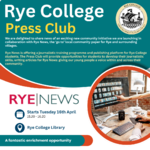Overview of Department
Religious Education is a "necessary part of a broad and balanced curriculum" and is legally required by the Education Act (2022).
Religious Education is about understanding what makes people “tick”. At Rye College, we teach the East Sussex Agreed Syllabus for Religious Education which is "open, broad, exploring a range of religious and non-religious worldviews." This syllabus has as its principal aim: to explore what people believe and what difference this makes to how they live, so that pupils can gain the knowledge, understanding and skills needed to handle questions raised by religion and belief, reflecting on their own ideas and ways of living. The syllabus reflects the fact that "the religious traditions in Great Britain are in the main Christian," while taking care to "accord equal respect to different religious convictions and to non-religious belief." Within the curriculum, core modules explaining the key festivals of Christianity sit alongside modules studying Islam, Judaism, Sikhism and Buddhism as well as Humanist and other non-religious beliefs.
Curriculum Statement: Values and Aims
There are three key headings in our syllabus: "Making sense"; "Understanding the impact"; and, "Making connections". All units enable students to "make sense" of the religions and beliefs studied, "understand the impact" of these beliefs in people's lives and to "make connections" in their learning and their wider experience of the world.
Alongside developing students' own views, empathy and consideration towards others are key values in our RE curriculum. Students learn to develop "an aptitude for dialogue so that they can participate positively in our society, with its diverse religions and beliefs." They learn to weigh up the value of wisdom from different sources, to develop and express their insights in response and to agree or disagree respectfully. These are skills that stand them in good stead for the rest of their lives and make them valuable assets in any workplace. We examine key questions around spirituality, morality, fairness and justice, and our own places in the world, using real examples from religious communities and current affairs.
.jpg)
_(1)_(1).jpg)




